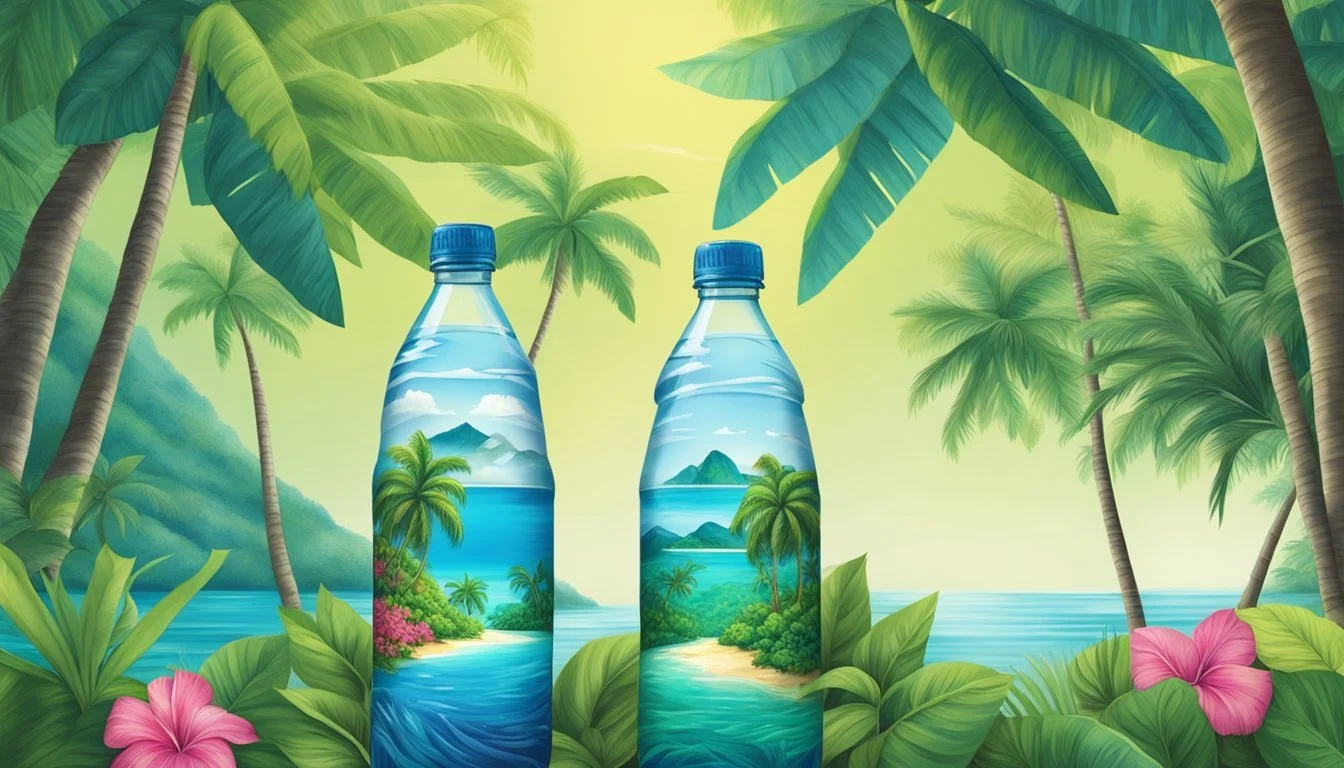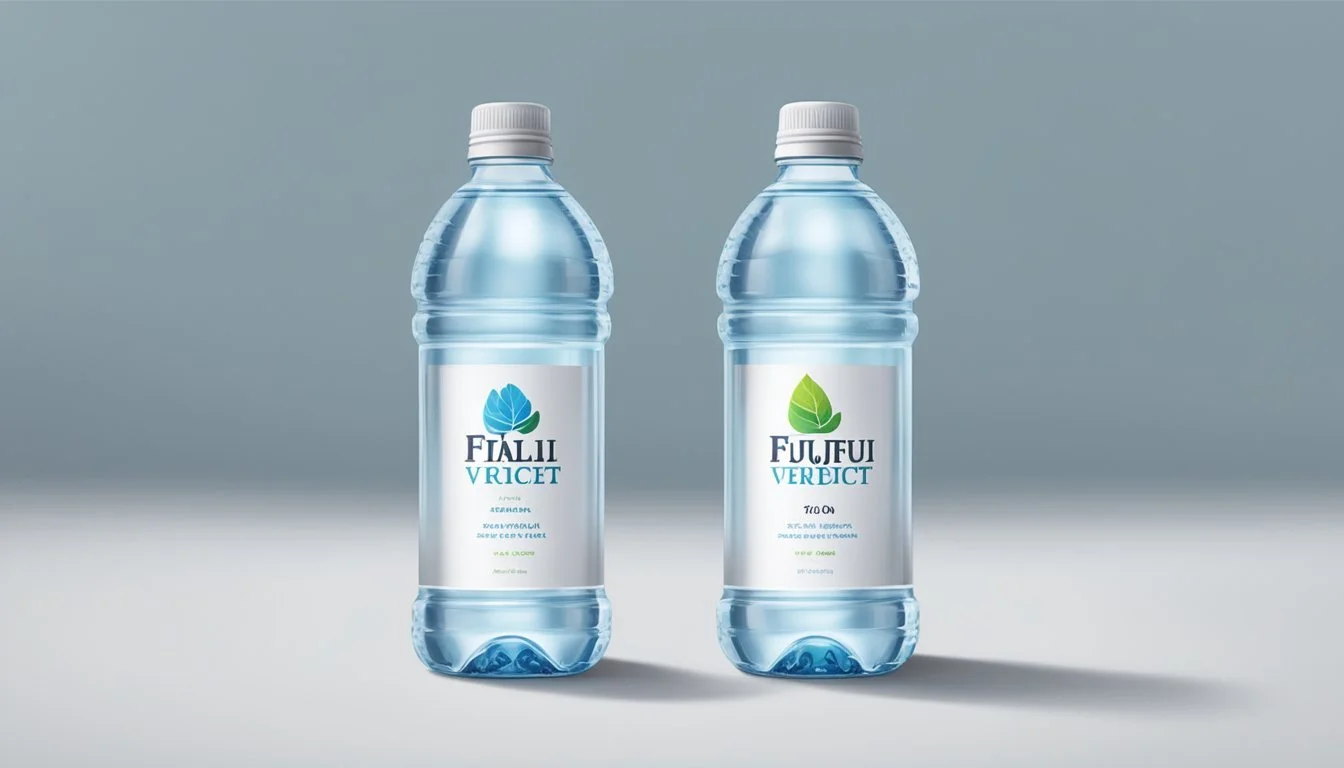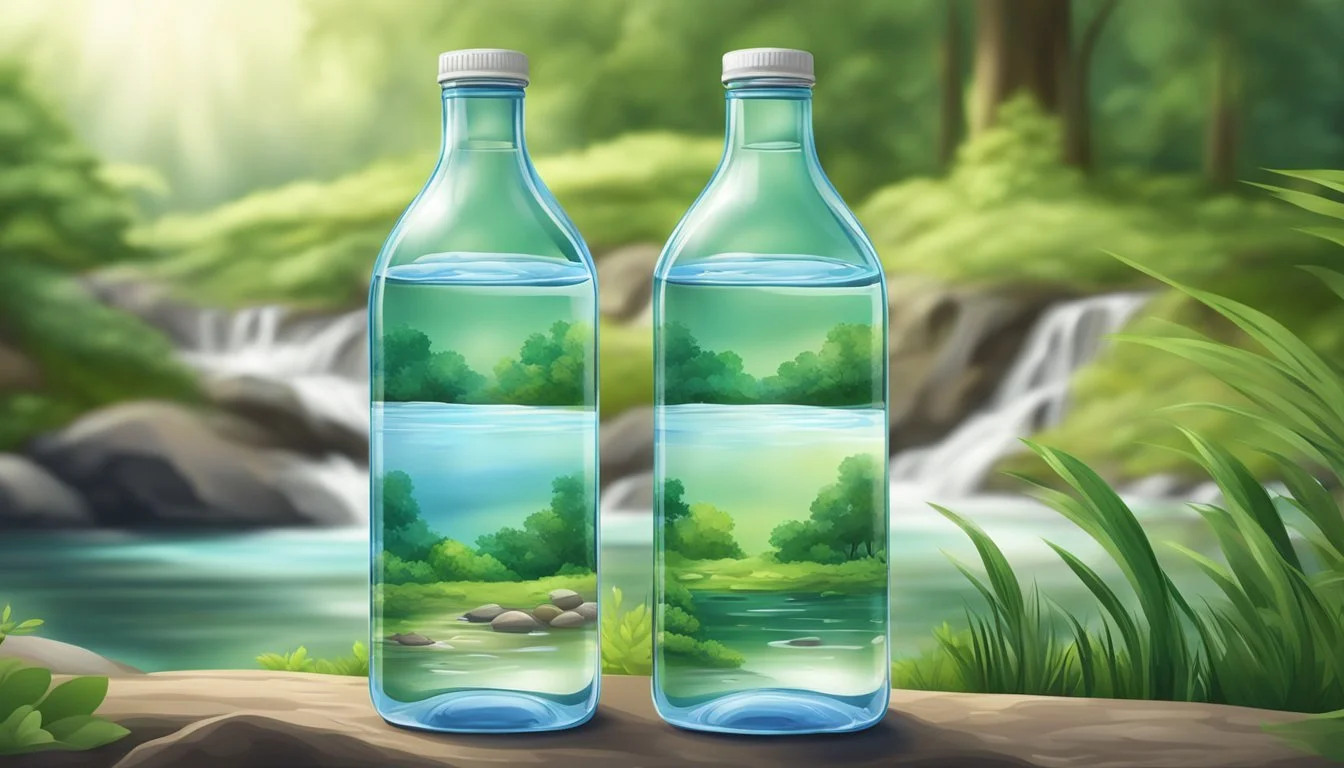Eternal vs. Fiji
Comparing Quality and Taste in Bottled Water Brands
Making a choice between bottled water brands can often come down to personal taste and values, such as environmental impacts and health benefits. In the realm of premium bottled water, Eternal Water and FIJI Water are frequently compared due to their unique sources and the purported quality of their water. Eternal Water is sourced from naturally protected springs in various locations, a feature they claim retains the water’s natural minerals and alkalinity. On the other hand, FIJI Water’s claim to fame is its artesian source, located deep within a rainforest in Fiji, which purportedly gives it a distinctive soft, smooth taste.
Both brands position themselves as superior choices in the bottled water market, offering not just hydration but also a luxurious experience. Eternal Water touts its high pH and naturally occurring electrolytes, suggesting potential health benefits linked to alkaline water. Conversely, FIJI Water emphasizes its untouched source, and its silica content, which some customers believe contributes to its silky mouthfeel and potential health advantages. Taste, however, is subjective, and preferences between the two can differ greatly among consumers.
When evaluating Eternal Water and FIJI Water, several factors come into play, such as the sustainability practices of each company, the water’s mineral content, and the overall environmental footprint from production to distribution. The bottled water industry is also often subject to scrutiny regarding the use of plastic bottles and the impact on the environment. Therefore, informed consumers may weigh these considerations as part of their purchasing decision, alongside the water’s taste and supposed health benefits.
Comparative Analysis of Eternal and Fiji Water Brands
In this comparative analysis, the focus is on differentiating Eternal and Fiji water brands in terms of their overall brand presence, health implications, taste, production methods, environmental factors, market availability, pricing, and consumer perception.
Brand Overview
Eternal Water is recognized for sourcing its natural water from protected underground springs in the United States. It is a prominent player within the niche of naturally alkaline water brands. On the other hand, Fiji Water is extracted from an artesian aquifer located in Fiji and is known globally for its soft mouthfeel and unique mineral profile.
Health Benefits and Concerns
Eternal Water boasts naturally occurring electrolytes and minerals with alkaline pH levels that may contribute to neutralizing body acidity. Fiji Water also claims health benefits due to minerals like silica, which is believed to support connective tissue health. However, concerns regarding the presence of microplastics have been raised in the industry, affecting numerous brands including Aquafina and Dasani.
Taste Profile
The taste of Eternal Water is described as smooth, which may be attributed to its natural filtration through layers of rock which provide a unique blend of minerals. Fiji Water is often characterized by a distinctive taste often described as fresh and soft, possibly due to the silica content.
Purification and Bottling Processes
Eternal Water uses Hydro-7™ purification process, which is their trademark filtration technique. Fiji Water undergoes a natural filtration process as it is collected from an underground aquifer, and the containment of the water source ensures minimal human contact, preserving its purity.
Environmental Impact
Both brands face scrutiny due to their use of single-use plastic bottles. Fiji Water's bottles are made from a type of plastic that is associated with BPA, which can have adverse health effects. Eternal and Fiji are both subject to criticism for the environmental impact of transporting water globally.
Product Availability and Consumer Reach
Eternal Water and Fiji Water are widely distributed across major retailers and online platforms such as Amazon. Fiji Water, in particular, enjoys international recognition and is available in over 60 countries, which exceeds the reach of many of its competitors, including Poland Spring.
Price Comparison
When comparing prices, Fiji Water typically comes at a premium cost relative to Eternal Water. Consumers are often willing to pay more for Fiji due to its brand reputation and exotic source. Poland Spring, Aquafina, and Dasani are considered more affordable options compared to these premium brands.
Customer Perceptions and Brand Loyalty
Eternal Water has a strong following among consumers who value the health benefits of alkaline water. Fiji Water enjoys brand loyalty among those who prefer its taste and are influenced by its premium branding. Both brands have garnered a dedicated consumer base, with Fiji Water leading in terms of global brand recognition.
Understanding Different Types of Bottled Water
When choosing between Eternal and Fiji bottled waters, it's key to comprehend the various types of water available, such as alkaline and spring, and to understand how mineral content affects health. Additionally, discerning the differences between filtered and natural waters is crucial.
Alkaline vs. Spring Water
Alkaline water, like that offered by brands such as Eternal, is characterized by its higher pH level, typically 9.5 or above. This is achieved through a process of ionization or by adding electrolytes. Alkaline water advocates suggest it can help neutralize acid in the bloodstream. Spring water originates from natural springs, with brands like Fiji Water and Mountain Valley Spring Water sourcing their products from underground aquifers; it is often lauded for its natural mineral content and fresh taste.
Mineral Content and Health Implications
Mineral water, such as Evian and Icelandic Glacial, typically contains naturally occurring minerals like magnesium and calcium. These minerals are crucial for bodily functions. For instance, magnesium supports muscle and nerve function, while calcium is fundamental for bone health. Electrolytes in water can aid in hydration and electrolyte balance, which is particularly beneficial during physical activity.
Filtered vs. Natural Water
Natural water refers to water that is bottled directly from its source with minimal processing, preserving its original mineral composition. Conversely, filtered water has been treated to remove impurities and may undergo processes like reverse osmosis. Some brands opt for filtering tap water, which can strip away beneficial minerals, while others use methods such as reverse osmosis followed by remineralization to ensure the final product retains mineral benefits.
Analyzing Water Quality
The purity and health impact of bottled water are primarily determined by its pH levels and the presence of contaminants. These factors differentiate water brands and influence consumer choice.
pH Levels and Health Relevance
Fiji Water is known for its natural alkaline level, boasting a pH typically around 7.7. This is slightly higher than the neutral pH of 7.0. Eternal Water also claims to offer natural alkalinity; however, precise pH levels can vary among different batches. Generally, alkaline water is considered beneficial by some health enthusiasts who believe it can help neutralize acid in the bloodstream. However, it is important to note that the body tightly regulates its pH balance, and the direct health implications of consuming alkaline water are not conclusively proven by scientific research.
Presence of Contaminants
A key concern in bottled water is the presence of contaminants. Both Fiji Water and Eternal Water have to comply with regulated standards for contaminants. These may include organic and inorganic compounds, as well as microplastics, which a study in Frontiers in Chemistry suggests are ubiquitous in bottled water. While these brands strive to maintain high water quality, the debate on the implications of microplastics on health persists, with more research needed to understand long-term effects. Consumers often rely on external analysis and reports such as those from Consumer Reports to gauge the levels of contaminants found in their bottled water of choice.
Exploring Health Benefits of Hydration
Maintaining proper hydration is essential for overall health, and choosing the right bottled water can play a significant role in this process. The benefits of hydration are broad, impacting everything from physical wellbeing to the functionality of vital systems in the body.
Hydration and Physical Wellbeing
Hydration is crucial for maintaining bodily functions. It affects various aspects of physical wellbeing, including:
Temperature Regulation: The body requires adequate water intake to regulate its temperature effectively through perspiration.
Joint Lubrication: Water helps to keep the joints lubricated, reducing the risk of discomfort and injury.
Skin Health: Adequate hydration contributes to skin elasticity and can lead to a more youthful appearance.
Bottled water, such as Eternal Water and Fiji Water, provides a convenient option for individuals to stay hydrated, especially when clean tap water isn't readily available. Both brands claim benefits associated with their unique mineral content derived from their natural sources.
Electrolytes and Their Role in Hydration
Electrolytes are minerals with an electric charge and are essential for hydration because they help balance the amount of water in the body. Eternal Water and Fiji Water boast their natural mineral content which includes electrolytes such as calcium, magnesium, and potassium. These electrolytes serve several functions:
Muscle Function: They are crucial for muscle contractions and help prevent cramps.
Nerve Signaling: Electrolytes contribute to efficient nerve signal transmission.
pH Balance: They help maintain the body's pH level.
Other products like Core Hydration and Blutrition also emphasize their electrolyte content, suggesting that their bottled water can support hydration needs effectively.
When selecting bottled water, it is important for consumers to consider both the hydration benefits and the source of the water to ensure they are making a choice that aligns with their health goals and preferences.
Environmental and Economic Considerations
When comparing bottled water brands like Eternal and Fiji, it's important to consider their sustainability practices and the economic impacts they have. These factors play a crucial role in determining the long-term viability and ethical standpoint of each brand.
Sustainability Practices
Sustainability is a key concern for bottled water companies as they navigate the balance between meeting consumer demand and minimizing environmental footprints. Eternal prides itself on using 100% recyclable bottles and sourcing water from sustainable springs. Fiji Water, as noted in the provided search results, faces criticism for the environmental cost of shipping its product long distances, contributing to its carbon footprint.
Other brands, such as Ethos Water and Boxed Water, aim to differentiate themselves through environmental ethos; Ethos Water contributes to humanitarian water programs, whereas Boxed Water uses paper-based cartons, arguing for a reduced plastic waste footprint.
Voss: Offers water in glass bottles as an alternative to plastic, providing a more sustainable packaging option.
Penta: Focuses on using renewable energy and reducing plastic in their bottle production process.
Economic Impact of Bottled Water Brands
The economy of bottled water is driven by consumer perception and demand. As the search results mention, Fiji Water has successfully cultivated an image that allows it to command a higher price point. The brand's marketing efforts have led to a significant number of consumers who are willing to pay more for what they believe is a superior product.
Ethos Water: Markets itself as ethical and socially responsible, which can influence consumers' willingness to purchase at a premium to support clean water initiatives.
The presence of premium brands like Fiji and Voss in the market indicates a consumer base that values not only the product but also the associated status. This, in turn, affects the economy surrounding bottled water, pushing prices and increasing competition among brands to offer unique selling points.
Consumer Insights and Preferences
The bottled water industry boasts a variety of brands, with consumer preferences influenced by factors such as brand reputation and product quality. This section explores popular bottled water brands and the purchasing decisions that guide consumer behavior.
Popular Bottled Water Brands
Brands like Fiji Water and Eternal Water are often discussed among consumers in terms of preference and quality. Fiji Water, known for its source in the Fijian islands, typically receives a favorable reception among bottled water enthusiasts. On the other hand, Eternal Water, sourced from naturally alkaline springs, also has its dedicated consumer base. Other popular brands include PepsiCo's Aquafina, Coca-Cola's Dasani, and Nestle's Pure Life. Voss, notable for its sleek packaging, along with regional favorites like Deer Park and Arrowhead, contribute to the diverse selection available on the market.
A survey reveals that consumers give Fiji Water the highest net favorability rating among U.S. adults, indicating a strong brand reputation. While not as prominent, Eternal Water scores positively with consumers valuing natural alkalinity and minimal processing.
Purchasing Decisions and Brand Reputation
When choosing between bottled water brands, consumers consider several factors. Reputation plays a crucial role, and brands like Fiji Water benefit from high net favorability ratings, which suggest widespread consumer approval. Aquafina follows in favorability, but with a lower score. Eternal Water, though less recognized than Fiji, holds its own with a dedicated customer segment that prefers its unique qualities.
The decision-making process can be influenced by discounts and promotions which brands like Fiji have been known to offer more frequently. Such actions can enhance their reputability and attractiveness to consumers, particularly on widespread retail platforms like Amazon.
Both Eternal and Fiji waters have consolidated their positions in the market by aligning their branding to perceptions of purity and premium quality. However, despite the efforts by brands such as Nestle Pure Life, reviews often place them as "average" in the minds of consumers, emphasizing the significance of a robust brand identity for bottled water companies.
Final Verdict
Choosing between Eternal and Fiji bottled water depends on factors such as personal health priorities, taste preference, and the consumer's lifestyle needs.
Best Bottled Water for Daily Consumption
Eternal Water claims an edge for daily consumption due to its naturally occurring electrolytes and minerals, sourced from protected underground springs. It offers hydration with a balanced pH, which can be beneficial to health. Fiji Water, while boasting a unique mineral profile and a taste that many people find pleasant, typically comes with a higher price tag which may not be practical for some consumers' daily intake.
Recommendations for Different User Demographics
Health-conscious consumers: Eternal Water, with its natural minerals and higher pH level, may support those seeking health benefits from their water.
Value-seeking customers: Nestlé Pure Life and Smartwater may be more suitable options, as they provide balanced electrolyte-enhanced water at a more accessible price point.
Taste enthusiasts: Those who prefer a smooth and fresh taste might opt for Fiji Water, celebrated for its soft mouthfeel and clean taste.
Environmentally concerned: Consumers focused on environmental impact should consider the sustainability practices of the bottled water brand before making a decision.
References
When comparing Eternal Water to FIJI Water, various factors such as brand recognition, promotions, and product quality must be considered.
Brand Recognition:
FIJI Water holds greater brand recognition in comparison to Eternal Water.
Promotions:
FIJI Water offers more frequent discounts and has several active coupon codes.
Product Quality:
Eternal Water:
Rated 3.9 based on 5 ratings.
Noted for not having significant advantages or disadvantages.
FIJI Water:
Known for lacking significant cons.
Eternal Water's score and general reception are sourced from Knoji, a platform that provides brand comparisons based on consumer feedback. FIJI Water's promotional strategies and brand standing were observed from marketing materials and brand analyses available in public domain.
Table of comparative features:
Feature Eternal Water FIJI Water Overall Score 3.9 Not specified Brand Recognition Lower Higher Discounts Less frequent More frequent Coupon Codes Not specified 9 active codes






